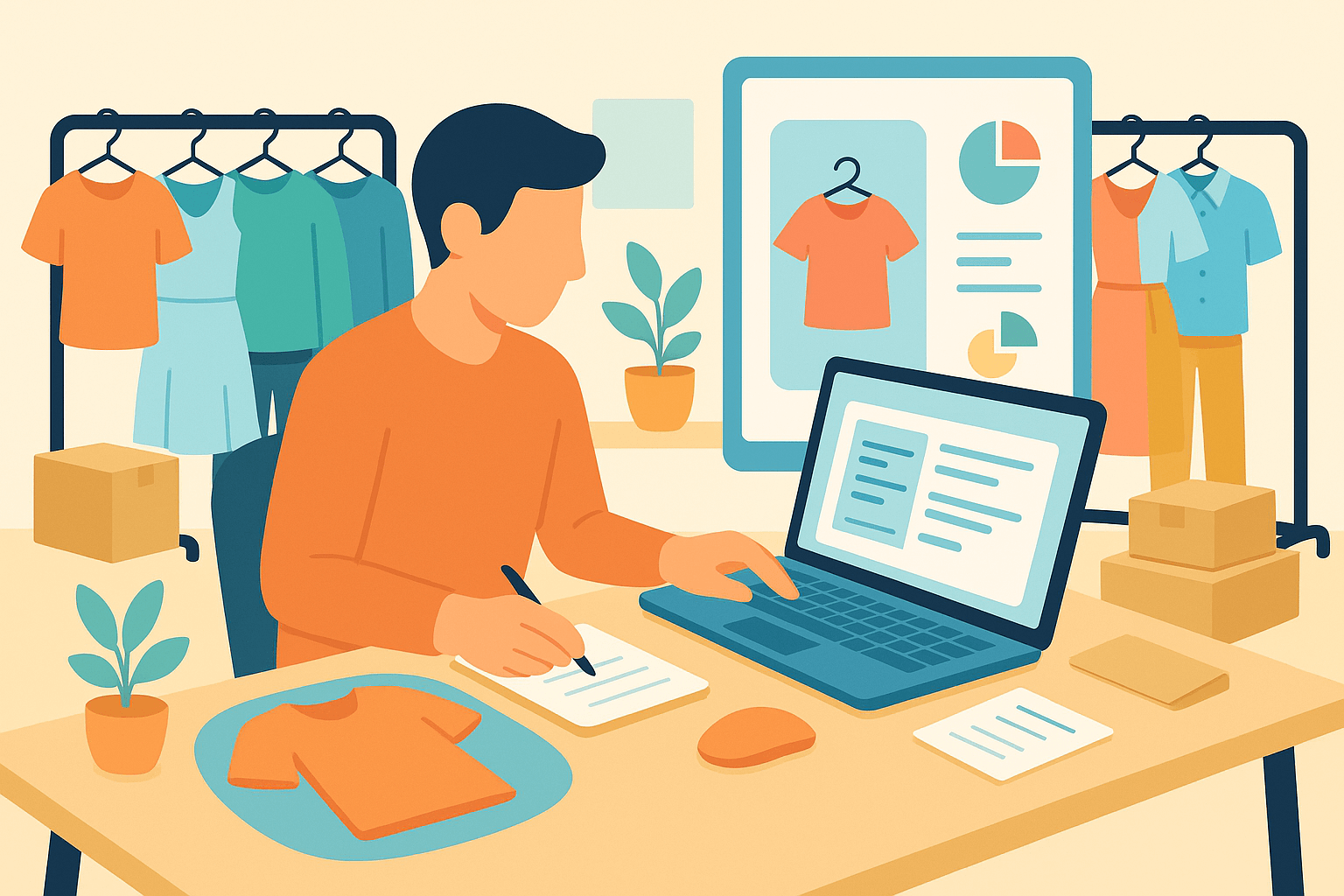Is Reselling Legal? Detailed 2026 Guide

What does reselling actually mean?
Reselling is when you buy an item (new or used) and then sell it to someone else, typically for a profit (fingers crossed).
No, it’s not manufacturing, it’s not wholesaling, and it’s not sketchy if you follow the rules. People have done it for … well, forever. But thanks to online marketplaces, it’s now a full-blown career path.
Real-world examples
- Thrift-to-profit flips: You find a $5 Patagonia jacket at Goodwill and sell it on Poshmark for $50.
- Retail clearance hauls: Target has a 70% off sale on baby monitors. You buy 10 and resell on Amazon at regular price.
- Estate sale goldmines: A box of dusty VHS tapes turns out to include a rare horror flick worth $200.
- Online arbitrage: You spot a pricing glitch on Walmart.com and resell those items through eBay for double.
- Weekend warriors: You sell sneakers, vintage tees, or kitchen gadgets you find at flea markets, consistently.
Reselling can start casual, but once you’re juggling platforms or shipping orders every day, you’re essentially running a small business.
That’s where Nifty comes in: Whether you're a casual flipper or scaling up to full-time seller status, Nifty handles the manual work, including syncing inventory, generating listings, crossposting to every platform, and tracking your profits. Instead of burnout, you get pure business growth.
So, is reselling legal in the United States?
In short? Yes, but only when done right. U.S. law allows individuals to resell goods they’ve purchased legally, thanks to something called the First Sale Doctrine. But when you cross into business territory or start dealing with brand-name items, more rules kick in.
The First Sale Doctrine gives you your rights
- You can resell physical items you legally bought, so there’s no special permission needed from the brand.
- This includes new, used, or secondhand goods from stores, thrift shops, estate sales, and liquidations.
- This law applies to physical goods only. Yep, digital goods, like e-books or software, often come with non-transferable licenses. They’re yours, but not yours to sell.
You don’t need to be an authorized seller
- You don’t have to partner with a brand or manufacturer to resell their product, as long as it’s real and unaltered.
- However, if you change the item (e.g., repackage it, remove parts, or bundle it), that may void your protection.
Once you act like a business, things change
- If you’re reselling as a side hustle or full-time gig, you’ll need to follow additional rules, like paying taxes, reporting income, and complying with platform policies.
- Brands and marketplaces may hold you to higher standards if you list large volumes or repeatedly sell certain types of goods.
Don’t confuse marketplace policies with the law
- Just because a platform flags your listing doesn’t mean it’s illegal. In short, it may just violate the platform's internal rules (like Amazon’s gated categories or eBay’s VeRO program).
- Even legal listings can be taken down if they trigger keyword filters, so always double-check the platform's TOS.
Takeaway
You’re legally allowed to resell almost anything you bought, but when your hustle becomes a business, you’ve got to play by more rules. Know your rights, keep your receipts, and don’t assume platform takedowns mean you broke the law.
Do you have to pay taxes on resale income?
Yes! Reselling is taxable income, even if it’s just a side hustle. The IRS doesn’t care if it’s your full-time job or weekend garage sale grind. If you make money from reselling, then they need to know about it.
1. If you sell online, the IRS will see it
- Payment platforms now report sales: Sites like PayPal, Venmo, and marketplace payouts (e.g., Poshmark, eBay, Depop) must issue a 1099-K if you make over $600 a year.
- It doesn’t matter how small the profit is: Even if you're only flipping a few items a month, if the annual total is above $600, it still counts. So, it’s not about profits, but proceeds. Even if you made $1 off of that $600, it counts, so stay on top of your COGS (cost of goods sold) to stay dandy come tax season.
2. Deductions can help balance the books
- You can write off business expenses: Think shipping costs, platform fees, inventory purchases, supplies, and tools like Nifty.
- Keep those receipts organized: If you’re audited, you’ll need proof of everything, so legit sourcing matters.
3. Track everything the smart way
- Nifty has built-in tax tracking tools: Use Nifty’s analytics to log profits, track expenses, and prep for tax season with some pep in your step. It also gets you tax-ready reports whenever you need them.
- Don’t panic over spreadsheets: You get a clear picture of what you made.
When does reselling become illegal?
Reselling in itself isn’t shady, but what you’re selling and how you’re selling it absolutely can be. Here’s when reselling goes from side hustle to legal trouble.
Some items are always off-limits
- Stolen, fake, or restricted goods = automatic no-go: Think designer knockoffs, stolen merch, recalled products, or anything like alcohol, concert tickets, or prescription meds.
- Even secondhand stuff has limits: Reselling recalled baby gear or expired beauty products? That’s not legal either.
Logos and labels can get you in legal hot water
- Using brand names incorrectly = trademark trouble: Listing a knockoff as “Nike” or using logos without permission breaks IP law fast. Even saying a purse is “Chanel-like” is a no-no.
- Repackaging without approval is risky too: You can’t “DIY bundle” a branded product and slap your name on it. (Basically, don’t put together a bunch of branded products and say they’re “yours”.)
- Using a stock photo without permission: This is out-and-out copyright infringement, so that’s also a big no-no.
Manufacturer deals aren’t optional
- MAP agreements set pricing limits: If you undercut a brand’s Minimum Advertised Price, they can cut you off, or worse.
- Ignore VeRO programs and get banned: Big platforms like eBay and Amazon protect brand owners. Violate those rules and your listings vanish into the ether. eBay explains these here.
Can you legally resell at a higher price?
Raising prices after a purchase isn’t inherently illegal, but there’s a fine line between legit resale and price gouging.
How to resell right without crossing any legal wires
- Reselling ain’t price gouging: Most of the time, it’s legal to mark up a product you bought, especially if you added value, like cleaning, bundling, or professional photos. It’s capitalism 101.
- Emergencies change the rules: During disasters, like COVID, most states activate anti-gouging laws (once a state of emergency has been declared). Selling sanitizer at a 900% markup? That’s a hard no in about 40 states.
- State rules vary a lot: Some states set hard limits (like 10% max increase), others use fuzzier “incomprehensible” language. And some don’t regulate it at all, but marketplaces still might.
- Platforms have their own caps: eBay, Amazon, and others can flag, delist, or ban sellers for what they define as excessive markup, even if it’s technically legal in your state.
- Perceived value matters: Selling a vintage item or limited edition at a high price is usually fair game. But flipping toilet paper during a crisis? Not so much.
Top 5 tips for avoiding legal trouble as a reseller
Staying compliant means protecting your time, your income, and your ability to keep reselling long term. Good habits now mean more smiles later.
- Always keep proof of purchase: If you can’t prove you bought it legally, you risk getting flagged for selling stolen goods. Save receipts, confirmations, or even screenshots from thrift apps.
- Know what each platform allows: eBay, Amazon, Depop, and others have different rules. Break them, and you could lose your account overnight. Get a good look at policies.
- Steer clear of gray market goods: These are legit products sold through unofficial channels (like international versions or bulk liquidation). They’re not illegal, but they can get you banned or hit with brand takedowns.
- Stay away from restricted categories: Think alcohol, medical supplies, event tickets, anything with government rules or third-party restrictions needs extra caution (or avoiding altogether).
- Watch for trends that seem “too good”: If something’s blowing up fast and seems super easy to flip, check that it’s allowed. Counterfeit risks and copyright issues often ride trend waves.
Helpful tools and templates are your friend
- Use pre-made disclaimers and return policies: Sites like Termly or Shopify’s policy generator offer editable templates.
- Sourcing checklists helps keep you on point: Printables from seller groups or custom Google Sheets make audits easier.
- Track taxes and take it easy: Try TaxAct Self-Employed or QuickBooks for fee breakdowns, sales reports, and IRS-friendly exports.
How Nifty helps
Compliance starts with clarity, Nifty tracks your sales data, and expenses all in one dashboard. Forget about panicking when tax season hits!
Launch your resale biz the right way
Stop asking yourself if reselling is legal. It is, and it’s easier with Nifty, the best AI reselling platform and command hub that makes crosslisting, automation, and analytics painless, fast, and way more fun than accidentally deleting inventory spreadsheets. And yes, it pays for itself.
- AI listing moves: Upload a photo, and Nifty’s AI builds pro listings, with SEO-optimized titles and descriptions, and trending hashtags. Say goodbye to your death pile in a matter of minutes.
- Crosslist now: With a couple of clicks, post your stuff across Poshmark, eBay, Mercari, Depop, and more. No copy-paste or dealing with a million tabs.
- Automatic delisting? Handled: When you make a sale, Nifty pulls that item from every marketplace. Say goodbye to double-selling heartache and “sorry, it’s already gone” apology messages.
- Bulk tools = no busywork: Relist, update, or discount dozens of items at once. Schedule everything, spare yourself the clicks, and keep your store looking fresh.
- Analytics and profits are real: Track sales, fees, top performers, and slow movers in one clean dashboard, so you can actually see what’s working and what’s taking up valuable space.
What are you waiting for? Get your 7-day free trial started today, and see how Nifty can make your reselling experience so much easier.
FAQs
1. What’s the best automation tool for reselling?
If you’re juggling platforms and tired of logging in constantly, Nifty is your best bet. It automates listings, delisting, offers, and even sales tracking across Poshmark, eBay, Mercari, Depop, and Etsy.
2. Is it legal to resell Amazon or eBay purchases?
Yep. Thanks to the First Sale Doctrine, if you bought the item legally, you can usually resell it. Just don’t mess with trademarks or packaging.
3. Can I resell branded products without getting sued?
You can resell branded items you bought legally, but don’t use brand names in misleading ways or repackage things. Yep, that’s where trouble starts.
4. Do I need a business license to resell products?
Not always. Casual sellers don’t usually need one, but if you’re earning consistently or running it like a biz, check your local laws.
5. What are the resale laws in my state?
They vary. Some states care about sales tax, others care about permits. Use your state’s Department of Revenue website as a starting point.





.jpg)
